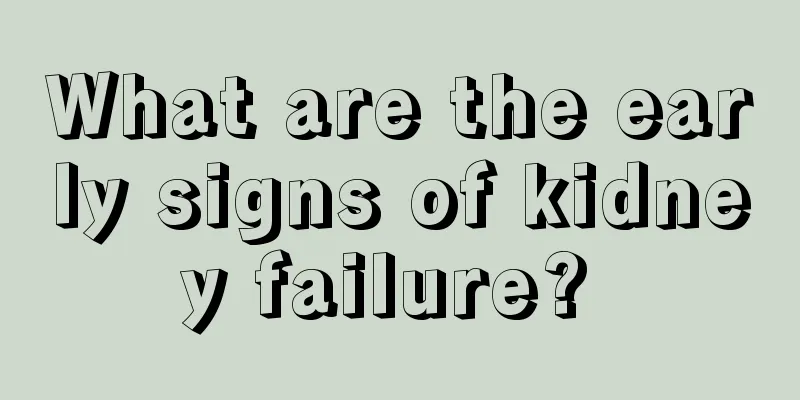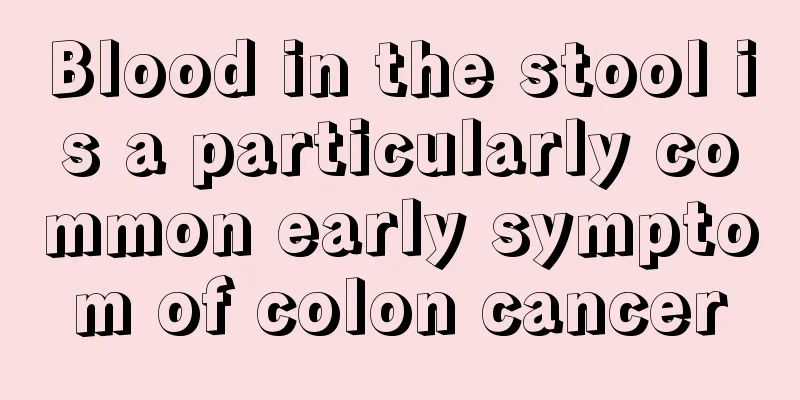What are the early signs of kidney failure?

|
The kidneys are the core organs of the human body. They act like a filter, filtering out waste in the body and excreting it through the urethra to ensure the health of the body. Once there is a problem with the kidneys, it will cause great harm to the body and even threaten the patient's life. Let's take a look at the early signs of kidney problems. Signal 1: Edema The first thing that appears is edema. It depends on the specific condition of the edema, which can be severe or mild. This is an obvious symptom of nephritis. The general symptoms are eyelid or facial edema in the morning, and edema in the lower limbs in the afternoon. Signal 2: High blood pressure High blood pressure is also a sign of poor kidney function. Because the kidneys are located at a high position, kidney problems are more likely to occur when high blood pressure exists. I hope everyone can pay attention to this. It can be seen that hypertension and kidneys affect each other. Therefore, if blood pressure persists, be careful about whether there is a problem with the kidneys. Signal three: Abnormal urine The abnormality of urine is mainly manifested in the decrease or increase of urine, which is almost a necessary phenomenon for all patients with chronic nephritis. Patients with edema will find that their urine volume decreases, and the greater the degree of edema, the more obvious the decrease in urine volume. Too much or too little urine is a sign of poor kidney function. The normal urine volume is 1000~2000 ml/day, with an average of about 1500 ml/day. Whether the urine volume increases or decreases, dryness and dullness of the face may be manifestations of kidney disease, especially nocturnal polyuria is often a signal of kidney disease. Signal 4: Don’t want to eat Loss of appetite, anorexia, or even nausea and vomiting are also common symptoms of kidney disease. Therefore, the complexion is sallow and dull. Some patients always go to the gastroenterology department or hepatology department first to see if they have stomach or liver disease. If they find that they do not have stomach or liver disease, they just leave it alone and forget to see a nephrologist, which results in delaying the treatment. |
<<: Is donating platelets harmful to your health?
>>: How to diagnose early Parkinson's disease?
Recommend
What is the diet for nasopharyngeal cancer
Nasopharyngeal cancer is now familiar to many peo...
The best way to deal with a sprained ankle
In life, we often encounter the situation of &quo...
What are the symptoms of early lung cancer? 4 common symptoms of early lung cancer
Daily diet is very important for preventing lung ...
Is the cost of treating hamartoma expensive?
Is it expensive to treat hamartoma? Patients with...
What foods are distributed
There are many common foods in life, and the food...
What are the correct usage and steps for lotion?
All women who have put on makeup know that if the...
Is liver cancer contagious? Check out some causes of liver cancer
Primary liver cancer is one of the most common ma...
Feeling hot in the middle of the night
Feeling hot in the middle of the night is the mos...
The difference between one shot and three shots of cervical cancer vaccine
Whether it is a bivalent, quadrivalent or nine-va...
What is the method to make homemade snot slime without adding glue?
In daily life, many people like to play with snot...
The disappearance of diabetes symptoms is not necessarily a good thing
Ms. Qiu's mother was diagnosed with diabetes ...
Sitting in the office for a long time can lead to a high incidence of cervical cancer. What are the other causes of cervical cancer?
According to statistics from the World Health Org...
Apply gallnut and angelica root to the navel
Traditional Chinese medicine culture is profound ...
Will gastric bleeding definitely cause diarrhea?
Diarrhea is a common symptom in life. People gene...
Treatment methods for 4 plus urine protein
We all know that our bodies are covered by variou...









